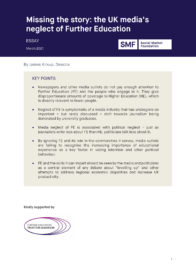This essay is not a conventional think-tank report. It is not, directly at least, about government policies or national priorities, but about the climate in which policies and priorities are set. It is about education, but also about journalism and the media industry, and it is written by a former journalist who still, from time to time, works in that trade.
Journalism matters. The selection of topics for coverage matters most of all. What makes news – and what does not – helps shape those national priorities, from which flow decisions by politicians and other policymakers about how to allocate scarce resources, including money and – sometimes more valuable — attention.
This essay is about something that doesn’t make news, doesn’t get covered, and the effects that has. It’s about Further Education (FE).
- Newspapers and other media outlets do not pay enough attention to Further Education (FE) and the people who engage in it. They give disproportionate amounts of coverage to Higher Education (HE), which is directly relevant to fewer people.
- Neglect of FE is symptomatic of a media industry that has undergone an important – but rarely discussed – shift towards journalism being dominated by university graduates.
- Media neglect of FE is associated with political neglect – just as journalists write less about FE than HE, politicians talk less about it.
- By ignoring FE and its role in the communities it serves, media outlets are failing to recognise the increasing importance of educational experience as a key factor in voting intention and other political behaviour.
- FE and the skills it can impart should be seen by the media and politicians as a central element of any debate about “levelling up” and other attempts to address regional economic disparities and increase UK productivity.
This report is sponsored by the Further Education Trust for Leadership.


